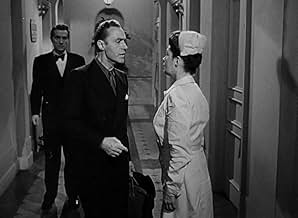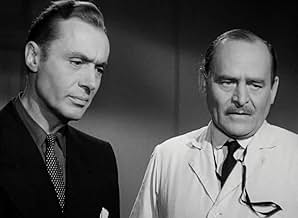CALIFICACIÓN DE IMDb
6.3/10
2.1 k
TU CALIFICACIÓN
Agrega una trama en tu idiomaIllegal refugees lead dark lives in pre-World War II Paris.Illegal refugees lead dark lives in pre-World War II Paris.Illegal refugees lead dark lives in pre-World War II Paris.
- Dirección
- Guionistas
- Elenco
- Premios
- 3 premios ganados en total
Richard Alexander
- Gestapo Agent
- (sin créditos)
Sylvia Andrew
- Milan Charwoman
- (sin créditos)
Frank Arnold
- Newsboy
- (sin créditos)
Jessie Arnold
- Cashier
- (sin créditos)
George Balooi
- Scheherazade's Waiter
- (sin créditos)
Opiniones destacadas
This is certainly not Ingrid Bergman's best movie, though her performance as Joan, and Boyer's as Ravic, are terrific. But you will never see a more beautiful Ingrid than in the magnificent black and white =chiaroscuro= of Russell Metty's photography, and Ingrid is very touching as the "lost woman" hinted at but never fully realized in "Casablanca" and "Notorious." Even considering that Bergman was gorgeous on screen for almost forty years, her stunning image in this somewhat confused thriller-soap opera, is worth the price of admission; plus the dialogue is pretty good, and you get to see Charles Laughton as an evil Nazi colonel!
Paris, whether real or imagined, has rarely looked so spiritually and atmospherically gloomy on screen as it does in this underrated wartime romantic drama by Lewis Milestone. While the stark chiaroscuro black-and-white cinematography of the venerable Russell Metty certainly plays a hand in painting a bleak portrait of the refugee-laden French capital of the late 1930s, these conditions in the film are also derived from the fact that a good portion of it unfolds during many a rainy night. And it's under such circumstances that our protagonists—the hard-bitten, oft-deported Dr. Ravić (Charles Boyer), a victim of the Nazi regime when he was a member of the Austrian underground, and Joan Madou (Ingrid Bergman), a dispirited Italian-born cabaret singer—meet and eventually fall in love. However, this is neither the cutesy nor the heedless kind of love so often seen in lesser films. It is, rather, of the sort that takes place between two complex, multifaceted individuals who are world-weary, are aware of their strengths and weaknesses, and, most importantly in this case, know that they have little to no control over their impending future. Needless to say, both actors, who earlier worked together in George Cukor's Gaslight (1944), come through with strong, authentic performances; Bergman, especially, as her character grows the most and requires her to depict various shades. To its credit, the film's low-key, matter-of-fact approach isn't merely relegated to the love story; its political intelligence is equally sober and attentive. And the same could be said for Milestone's direction—he does not get many opportunities here to showcase his trademark camera movements. Adapted from a novel by German author Erich Maria Remarque, who also provided the source for Milestone's antiwar classic All Quiet on the Western Front (1930), this rich and engrossing film may have been ignored in its day but is bound to emerge triumphant sooner or later.
This could have been a much better movie. Boyer's disenchanted, vengeful refugee doctor is excellent and Bergman's Joan, unable to commit or disengage, could have been a fascinating characterisation. But while individual scenes are very fine, the film, as a whole, is oddly disconnected, suggesting ruthless cutting. The sub-plot involving Laughton's porcine Gestapo bully is perfunctory and we get far too much of Calhern's emigre. Still, the black and white photography is impressive, and I rather went for the doom and gloom!
Not sure about this one. There's much to like; the atmosphere, the camera work, the lighting and shadows, the closeups, the acting. But something's missing, perhaps continuity, or the impression that it all somehow fits together. Taken as a series of vignettes this film is very good. Combine the vignettes to tell a subset of the original story and it could be even better. But put it all together and it succumbs under the sheer weight of all the subplots.
And yet, despite my criticism, I am pleased to have seen it. As I said there's much to like, especially the acting. Louis Calhern is always a joy and here he lends a nuanced gravitas to his part. Charles Boyer is better than usual playing a tormented refugee torn between love and revenge. Charles Laughton is the pivot about which the story revolves and without him his one dimensional character would have been but a caricature. There's even a memorable cameo by an uncredited William Conrad. His scene is no more than a minute or so but it's not one you're likely to overlook or forget. But the best reason to watch it is of course Ingrid Bergman. Her effortless ability to switch personalities simply draws you in to her performance. Here she plays an insecure wreck, an incredibly seductive, infuriatingly deceitful and mostly terrified woman. Her character's choices are not perhaps entirely honorable but with Bergman who cares...
And yet, despite my criticism, I am pleased to have seen it. As I said there's much to like, especially the acting. Louis Calhern is always a joy and here he lends a nuanced gravitas to his part. Charles Boyer is better than usual playing a tormented refugee torn between love and revenge. Charles Laughton is the pivot about which the story revolves and without him his one dimensional character would have been but a caricature. There's even a memorable cameo by an uncredited William Conrad. His scene is no more than a minute or so but it's not one you're likely to overlook or forget. But the best reason to watch it is of course Ingrid Bergman. Her effortless ability to switch personalities simply draws you in to her performance. Here she plays an insecure wreck, an incredibly seductive, infuriatingly deceitful and mostly terrified woman. Her character's choices are not perhaps entirely honorable but with Bergman who cares...
The film tells about Dr. Ravic(Charles Boyer),he's an exiled living in Paris before the Nazis penetrate into the city.Under false name and with no papers,aware always that the Surete(French gendarmes)could be sent away or jailed.One day he sees to Haake(Charles Laughton) a Gestapo official who tortured his anterior love and he's looking for revenge.One night in a bridge over river Sena,the refugee doctor finds to Jean Madou(Ingrid Bergman),a beauty and mysterious gal and he rescues her from a suicide attempt.The 2ªWW isn't the best environment for romanticism and a love affair but he falls is love with her.
The film is a romantic melodrama with magnificent actors.However is slow moving and little bit bored .The casting is frankly magnificent.Charles Boyer as sad refugee and gorgeous Ingrid Bergman as unfortunate damsel in disgrace are excellent.The secondary cast is awesome, impressive Charles Laughton as Nazi official, one of the his usual roles as villain and the lion's share of the acting meat deservedly goes to Louis Calhern as an exiled Russian colonel of the Czar who's a doorman in a show-coffee. Atmospheric black and white cinematography by Russell Metty who later made colorful super-productions.The film was restored with longtime but going on tedious,sluggish and dull.The motion picture is regularly directed by Lewis Milestone who directed various classic warlike movies.The flick is based on Erich Maria Remarque novel and was posteriorly rendered for TV(1985)by Waris Hussein with Anthony Hopkins and Lesley Anne Down.The picture will like to Ingrid Bergman and Charles Boyer enthusiastic.
The film is a romantic melodrama with magnificent actors.However is slow moving and little bit bored .The casting is frankly magnificent.Charles Boyer as sad refugee and gorgeous Ingrid Bergman as unfortunate damsel in disgrace are excellent.The secondary cast is awesome, impressive Charles Laughton as Nazi official, one of the his usual roles as villain and the lion's share of the acting meat deservedly goes to Louis Calhern as an exiled Russian colonel of the Czar who's a doorman in a show-coffee. Atmospheric black and white cinematography by Russell Metty who later made colorful super-productions.The film was restored with longtime but going on tedious,sluggish and dull.The motion picture is regularly directed by Lewis Milestone who directed various classic warlike movies.The flick is based on Erich Maria Remarque novel and was posteriorly rendered for TV(1985)by Waris Hussein with Anthony Hopkins and Lesley Anne Down.The picture will like to Ingrid Bergman and Charles Boyer enthusiastic.
¿Sabías que…?
- TriviaThe rough cut of the film ran four hours. In reducing it to two hours, several actors were cut, including Ruth Warrick. She does appear briefly in the restored 133-minute version.
- ErroresWhen Ravic takes his gun and goes to look for Haake in the streets, the first shot of him has been reversed for some reason as evidenced by the signs he passes, which are backwards.
- Citas
Joan Madou: He wanted to kill me. They always talk about it but they never do.
[laughs]
Joan Madou: You wouldn't want to kill me.
- ConexionesFeatured in Legendy mirovogo kino: Charles Boyer
- Bandas sonorasLong After Tonight
(1948) (uncredited)
Music by Rudolph Polk
Music by adapted from the Russian folk song "Prochlada"
Lyrics by Ervin Drake and Jimmy Shirl
Sung by an uncredited singer dubbing Ingrid Bergman at the Scheherazade casino
Selecciones populares
Inicia sesión para calificar y agrega a la lista de videos para obtener recomendaciones personalizadas
- How long is Arch of Triumph?Con tecnología de Alexa
Detalles
Taquilla
- Presupuesto
- USD 5,000,000 (estimado)
- Tiempo de ejecución
- 2h(120 min)
- Color
- Relación de aspecto
- 1.37 : 1
Contribuir a esta página
Sugiere una edición o agrega el contenido que falta


































